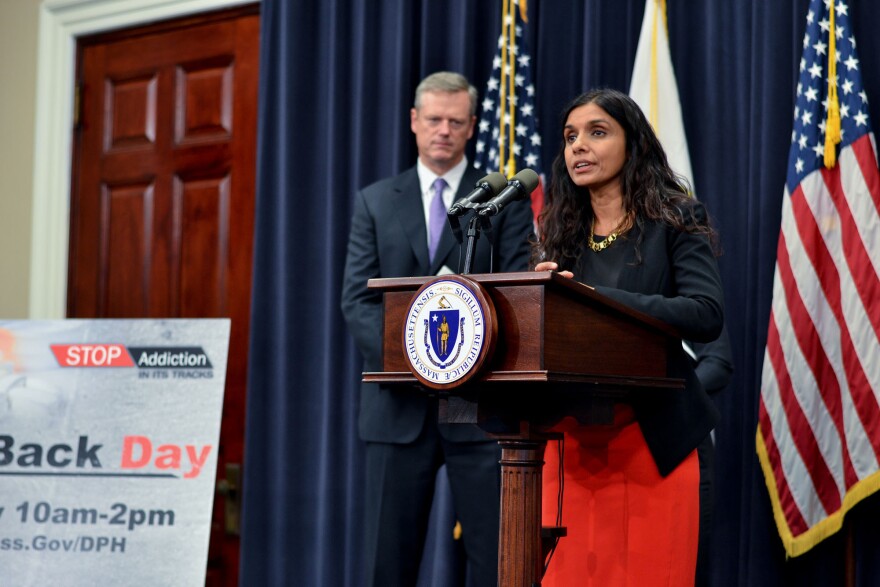The state's database is connected to neither other states nor VA health clinics.
With an opioid crisis still underway across the country, pain and how it’s treated is under scrutiny. The Centers for Disease Control in Marchcame out with national standards for prescribing opioid painkillers, notably that clinicians should consider other options first.
Also in March, a new law in Massachusettsnow limits access to narcotic painkillers, and requires pharmacists and doctors to use a state prescription medication database -- a database that’s missing some key information.
The law and the recommendations factor in the day-to-day operations for Joseph Viadero, a doctor in Turners Falls, Massachusetts. Some of his patients experience ongoing pain from arthritis, cancer treatments, and old injuries. He said now, more than ever, he weighs several factors before writing a prescription for oxycodone or hydrocodone.
“Most of my patients, I hope are just dependent upon it, meaning that they have chronic pain, which require scheduled opioids and the like,” Viadero said. “But we have to be very careful that patients are not taking these medications for the euphoric effects of narcotics, for instance.”
The System
Being careful includes checking the statewide database known in Massachusetts and many states as the Prescription Monitoring Program, or PMP.
Taking a break between patients, Viadero types a name of one patient, an older woman, into the system. He does this every time he prescribes a painkiller medication, to make sure his patients aren’t receiving opioids from another health care provider in the state. Pharmacists enter the data upon filling the prescription.
Viadero points to the screen.
“This is one of the patients that there was an alert sent up earlier, that she had gotten a prescription from a provider, other than me,” he said.
The other provider was a back specialist. When these alerts happen, Viadero said he sits down with his patients to have a chat.
California had the first prescription drug database in the country. It began operating in 1939. Back then, it was used by law enforcement to track down the criminal aspect of the prescription drug world. It wasn’t until more recently the databases became public health oriented.

Electronic databases like the one Viadero uses operate in every state but Missouri. The Massachusetts system is expected to get a face-lift within a few months. And it’s a good thing, doctors say, because this one is hugely time consuming, and in many cases health care providers have to constantly flip between screens.
“It was a difficult system to use,” said Dr. Monica Bharel, commissioner of Massachusetts Department of Public Health. “An eleven click process.”
Bharel was a practicing physician up until recently. In Massachusetts, the DPH oversees the state database, which at the end of 2014 cataloged 13 million narcotic prescriptions.
‘Drug Diversion Knows No State Borders’
In December 2015, the state announced it had signed a $6 million, five-year contract with Appriss, the Kentucky-based company that will provide the new system, as it’s done already in dozens of states. Massachusetts will be able to connect with other Northeast databases and beyond.
“Drug diversion knows no state borders,” said KrishnanSastry, with Appriss.
Sastry said once an agreement with Massachusetts is finalized, the more streamlined database can be up and running in almost no time.
“The actual technical implementation and testing and getting ready to share data with each other, that can be very, very fast. As short as three to four months,” he said.
Doctors and pharmacists have for years been using their state databases in silos. Connecticut’s director of drug control John Gadea, who is also a pharmacist, said without Massachusetts and other states connected to the hub, there’s a huge hole.
“For physicians it would be highly advantageous and critical that they would know patients are obtaining products,” Gadea said. “Whether legitimately or illegitimately, from just right across the border, which in that case could be nothing more than a couple of hundred yards.”
The only way these opioid issues can be addressed, Gadea said, is if all possible information is available.
Veterans’ Prescriptions Missing
But Massachusetts, and 10 other states are missing another element. Pharmacists at the Veterans Administration can look into the state databases, but they’re not adding any information about opioid prescriptions they fill.
Massachusetts Department of Public Health commissioner Monica Bharel said that change should also happen within a few months.

About 4,200 veterans receive prescribed opioid painkillers from VA pharmacies in Massachusetts.
“We’ve been working and coordinating with the VA, in getting them on board,” she said. “This new system is definitely a priority for us and a priority for them.”
Bharel would not talk about the delay, but a pain psychologist at the VA facility in Bedford, Massachusetts, TuNgo, said she was told it was a technical problem.
“There were definitely some problems in terms of compatibility of software exchange so we that we could privately transmit the data from VA into state database. So that was my understanding when I first inquired about a year and a half ago,” Ngo said.
The database disconnect is well known at the highest levels of the VA. One year ago, in March 2015, VA Under Secretary Carolyn Clancy, also a doctor,testified before a Senate panel on its opioid prescription policies. Clancy said it was critical to get the connections up and running since more veterans are using outside health care, in addition to the VA.
Why weren’t all states receiving prescription information from VA pharmacists, she was asked at the hearing?
“We have identified that we have an internal disagreement among some of our IT folks around privacy and security issues, which we will be resolving very promptly,” Clancy responded.
Clancy faced pointed questions in the hearing from Connecticut U.S. Senator Richard Blumenthal. He asked Clancy to clarify, if he were a VA patient and went to a non-VA doctor, “that private provider has no way of knowing the doses of opioids that I’m receiving are from the VA system?”
“Correct,” Clancy responded.
Within days, the VA facilities in the Connecticut began reporting into the state database. Within months, the VA connected with 15 more states. But not Massachusetts, where about 4,200 veterans receive prescribed opioid painkillers from VA pharmacies.
Moving in the Right Direction
Even though Massachusetts’ system is in need of major upgrades, Dr. Joseph Viadero in Turners Falls said it’s still better than it was 10 years ago when hospital bulletin boards were covered with notes from doctors.
“We used to write letters to the emergency room, saying that ‘Patient X has been in our office seeking multiple refills on prescriptions. Please do not prescribe that patient any medications without checking with us,'” Viadero said.
Clinicians in private practice, Viadero included, and those at hospitals and at the VA, say they’re not just counting on the database to manage medications and help people with their pain. They’re asking patients to sign “pain medication agreements” before writing the prescriptions. Urine will be tested and pills counted during appointments, they’re told.
Health care providers are pushing ibuprofen, physical therapy and meditation. That’s before they offer something like Percocet.
This report was originally published by New England Public Radio.




